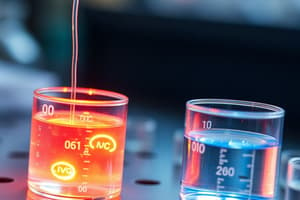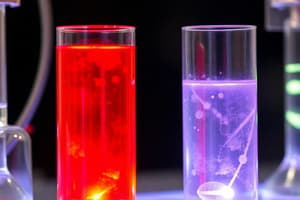Podcast
Questions and Answers
पानी के विद्युतविघटन का परिणाम क्या होता है?
पानी के विद्युतविघटन का परिणाम क्या होता है?
हाइड्रोजन और ऑक्सीजन गैस उत्पन्न होती है
विद्युतरासायनिक श्रृंखला क्या है और यह क्या मदद करती है?
विद्युतरासायनिक श्रृंखला क्या है और यह क्या मदद करती है?
विद्युतरासायनिक श्रृंखला एक सारणी है जिसमें तत्वों को उनके मानक इलेक्ट्रोड पोटेंशियल के क्रम में व्यवस्थित किया जाता है। यह धातुओं की पुनर्क्रिया की प्रवृत्ति और ऑक्सीकरण-अभिक्षेपण अवस्थान की समझ में मदद करती है।
कैथोड पर कौनसी गैस उत्पन्न होती है?
कैथोड पर कौनसी गैस उत्पन्न होती है?
हाइड्रोजन गैस
एनोड पर कौनसी गैस उत्पन्न होती है?
एनोड पर कौनसी गैस उत्पन्न होती है?
विद्युतरसायन को किस प्रकार से परिभाषित किया जा सकता है?
विद्युतरसायन को किस प्रकार से परिभाषित किया जा सकता है?
विद्युतरसायन को किसे कहा जाता है? और इसका क्या महत्व है?
विद्युतरसायन को किसे कहा जाता है? और इसका क्या महत्व है?
विद्युतरसायन के क्या-क्या प्रमुख अंग होते हैं?
विद्युतरसायन के क्या-क्या प्रमुख अंग होते हैं?
गैल्वेनिक कोशिकाएँ क्या हैं और उनका काम क्या है?
गैल्वेनिक कोशिकाएँ क्या हैं और उनका काम क्या है?
इलेक्ट्रोलाइसिस क्या है और इसका क्या महत्व है?
इलेक्ट्रोलाइसिस क्या है और इसका क्या महत्व है?
इलेक्ट्रोलाइट क्या होते हैं और उनका क्या महत्व है?
इलेक्ट्रोलाइट क्या होते हैं और उनका क्या महत्व है?
Flashcards
Electrolysis
Electrolysis
A process using electrical energy to drive non-spontaneous chemical reactions.
Galvanic cell
Galvanic cell
A device that converts chemical energy into electrical energy through a spontaneous redox reaction.
Electrolytic cell
Electrolytic cell
A device that uses electrical energy to drive a non-spontaneous redox reaction.
Electrolytes
Electrolytes
Signup and view all the flashcards
Electrode
Electrode
Signup and view all the flashcards
Cathode
Cathode
Signup and view all the flashcards
Anode
Anode
Signup and view all the flashcards
Electrochemical series
Electrochemical series
Signup and view all the flashcards
Active metals
Active metals
Signup and view all the flashcards
Passive metals
Passive metals
Signup and view all the flashcards
Study Notes
Chemistry 12th: Electrochemistry
Electrochemistry is a crucial branch of chemistry that deals with the relationship between electrical energy and chemical energy, and the changes caused in matter by passing an electric current. It involves the conversion of chemical energy to electrical energy and vice versa, and is essential for understanding various chemical processes and reactions. This article will focus on the subtopics of electrochemistry, including electrochemical cells, electrolytes, electrodes, and electrolysis.
Electrochemical Cells
Electrochemical cells consist of two metallic electrodes dipped in electrolytic solutions. There are two types of electrochemical cells:
- Electrolytic cells: These cells have a power source that drives the electrolysis reaction, and the system is designed to provide a stable voltage and current.
- Galvanic cells: Also known as voltaic cells, these cells generate electricity from chemical reactions between the electrolyte and the electrodes. An example of a galvanic cell is the familiar battery.
Electrolytes
Electrolytes are substances that conduct electricity when dissolved in water or other polar solvents. They provide a path for electrical current in electrochemical cells and are essential for various chemical reactions and processes. Electrolytes can be classified into two types:
- Strong electrolytes: These substances dissociate completely into their respective ions in solution and conduct electricity readily. Examples include hydrochloric acid (HCl), sulfuric acid (H2SO4), and nitric acid (HNO3).
- Weak electrolytes: These substances partially dissociate into their respective ions in solution and conduct electricity less readily than strong electrolytes. Examples include acetic acid (CH3COOH), ammonia (NH3), and ethanol (C2H5OH).
Electrodes
Electrodes are conductive surfaces that participate in electrochemical reactions, either as a cathode (negative electrode) or an anode (positive electrode). They can be made of various materials, such as metals, alloys, or carbon. The electrodes play a crucial role in determining the overall chemical reaction and the direction of the electric current.
Electrolysis
Electrolysis is a chemical process that involves the decomposition of water or other electrolytes into their respective gases by passing an electric current through them. This process is essential for various applications, including the production of hydrogen, oxygen, and other gases. The electrolysis of water, for example, produces oxygen and hydrogen gases according to the following reaction:
$$2H_2O \rightarrow 2H_2 + O_2$$
In this reaction, hydrogen gas (H2) is produced at the cathode, while oxygen gas (O2) is produced at the anode.
Electrochemical Series
The electrochemical series is a list of chemical elements arranged in order of their standard electrode potentials. This list helps in understanding the reactivity of metals and their tendency to undergo oxidation-reduction reactions. The series can be divided into two groups:
- Active metals: These metals are situated above hydrogen in the electrochemical series and have a high negative value of standard reduction potential. They readily react with cold water and dissolve in acids. Examples include Li, K, Ca, Na, Mg, Al, Zn, and Fe.
- Passive metals: These metals are situated below hydrogen in the electrochemical series and have a lower negative value of standard reduction potential. They are less reactive than active metals. Examples include Pb, Sn, Ni, and Cr.
Electrochemistry is a vast field with numerous applications in various fields, including energy storage systems, batteries, fuel cells, and the production of chemicals and compounds. A strong understanding of electrochemical principles is essential for students studying chemistry at the 12th grade level and is crucial for their performance in board exams and other competitive examinations.
Studying That Suits You
Use AI to generate personalized quizzes and flashcards to suit your learning preferences.




